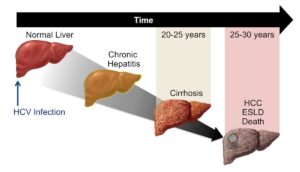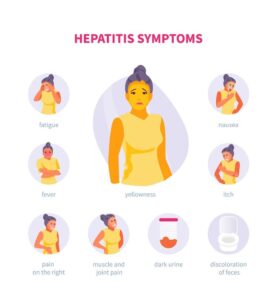Hepatitis cannot wait; Do not delay its diagnosis and treatment!
What is hepatitis?
The liver, which is associated with more than 500 basic body functions, regulates blood chemicals and bile production. It is the place of many essential physiological events such as glucose balance, production of plasma protein, fat, lipoprotein, production of bile acids and its secretion, storage of vitamins (B12, A, D, K).
Other functions of the liver include the breakdown of toxins in the blood, the metabolism of drugs, and the processing of blood from the intestines and stomach. Hepatitis is an inflammation of the liver. This inflammation can be caused by a viral infection, the use of certain medications, alcohol consumption, certain inherited diseases, autoimmunity, or excessive accumulation of fat in the liver.
Inflammation of the liver occurs in two types; acute and chronic. Acute hepatitis will go away in a few weeks, sometimes with severe symptoms. However, the chronic or long-term type does not cause significant symptoms and may lead to liver cirrhosis or liver cancer. Therefore, early diagnosis and treatment of this disease can prevent the progression of the disease and the death of the patient.
Click here to read more about the types, symptoms, and treatment of this disease.
How to protect yourself against various types of hepatitis virus?
The virus has five main types A, B, C, D, and E. Each has its own methods of transmission, treatment, and prevention, but in general, the following can be mentioned:
- Vaccination against hepatitis A and B. You will also be protected from hepatitis D if you get the hepatitis B vaccine. There are vaccines for hepatitis E in some countries.
- Have protected sex.
- Do not use shared syringes and needles.
- Observe the hygiene of eating and drinking. Wash your hands regularly.
- Use safe drinking water.
- Do not use other people’s personal belongings.

Diagnosis of hepatitis:
There are several methods and medical laboratory tests used to diagnose a person with hepatitis and its type (infectious or non-infectious).
1) Biochemical lab. tests to diagnose inflammation and liver damage: These tests measure enzymes and metabolites (substances that are made from metabolism) that are generally part of a more comprehensive test. For example, a test to determine the levels of the enzymes alanine aminotransferase or aspartate aminotransferase, as well as bilirubin, which is altered by liver damage.
2) Tests Screening to diagnose viral hepatitis and its type: After diagnosing the disease, the doctor prescribes these tests to determine the origin of the disease. Such tests are also used to diagnose the type of pathogenic virus and to determine whether it is acute or chronic, the presence of antibodies against the virus, and the burden of the virus to screen patients. Three types of A, B and C are most commonly tested.
3) Ultrasound and X-ray imaging to detect inflammation of the liver and its severity
4) Testing and screening to control the progression of liver damage and to clarify the patient’s treatment
5) Liver biopsy: An invasive procedure in which a small portion of liver tissue is removed under a microscope. This method is used if other tests do not determine the type of disease and liver problem.
What Medical laboratory Diagnostic tests are done to diagnose viral hepatitis?
A definitive diagnosis of viral hepatitis requires confirmation from a medical laboratory center. Tests performed to diagnose the type of pathogenic virus, whether the disease is acute or chronic, and to assess a person’s immunity to the virus include antibody tests (antibodies secreted against pathogens), antigen testing (viral proteins), and finding the genetic material (RNA) of the virus.
Antibody and antigen testing are both based on a routine laboratory method such as ELISA or recently with the development of the diagnostic assay with Immunoassay technology (ECL, CLIA). Antibodies and antigens are paired together like locks and keys and these techniques use this feature to identify them in the patient’s blood.
A molecular test called PCR is used to find the genetic material of the virus. Finding the genetic material of the virus requires a special type of instruments, and trained staff, which is done only in some medical diagnostic laboratories and using the latest facilities and technology in the world. During this test, if the virus genome is present in the patient’s blood sample, a large number of it is amplified to the extent that it can be identified.
Interpretation of antigen and antibody tests for hepatitis
Here are some examples of tests:
1) Hepatitis A IgM Antibody (Anti-HAV IgM): IgM is an antibody that is produced at the beginning of the body’s involvement with the infection and then gradually decreases. Therefore, the detection of this antibody in the patient’s blood sample indicates that he has recently (less) Has been infected with hepatitis A for 6 months or is currently fighting with the virus.
2) Hepatitis A IgG Antibody (Anti-HAV total / IgG): IgG stays in the body for a long time and creates immunity. Therefore, its identification in the patient’s blood indicates his immunity to this disease. (By vaccination or previous infection)
3) Hepatitis B Surface (HBS) Antigen: If the surface antigen of the hepatitis B virus is detected, a person has the disease and can transmit it.
4) Hepatitis B e (HBe) Antigen: The HBe antigen is a small protein fragment of the hepatitis B virus that is found even earlier than the surface antigen of the virus and in the early stages in the patient’s blood serum.
5) Hepatitis C Virus Antibody (Anti HCV): If the test is positive, it indicates that the person has already been infected with the hepatitis C virus.
6) Hepatitis D Virus (HDV) Antibody: This test determines the amount of both types of antibodies (IgG, IgM) related to hepatitis D in the patient’s blood.

World Hepatitis Day (WHD)
June 28 is known as World Hepatitis Day every year. This day coincides with the birthday of Dr. Baruch Blumberg, the discoverer of the hepatitis B virus, the creator of the first vaccine for the virus, and the winner of the Nobel Prize. The World Health Organization is dedicating this day to raising public awareness about viral hepatitis, methods of transmission, diagnosis, and prevention. This year’s motto (2021) is “Hepatitis can’t wait”. The slogan “hepatitis can not wait” points to the importance of eradicating viral hepatitis according to the World Health Organization plan (by 2030) and the need to continue the necessary activities even during the Quidd-19 pandemic to prevent the transmission of the virus. Therefore, if you are suspected of having viral hepatitis, be sure to perform the relevant test in consultation with your doctor.
Payvand Clinical & Specialty Laboratory is ready to serve you at the earliest time possible by providing complete services in the field of routine and molecular tests at the highest quality level. Due to the prevalence of various strains of CoVID-19, click here for in-home sampling services of Payvand Laboratory.




